These are more than just Intercoms!
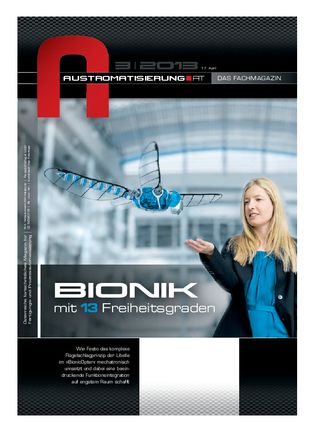
Thomas Recnizek editor at the reknowned Austrian technology trade magazine “Austromatisierung” reports on the reasons why Commend’s presumedly “simple” Intercom solutions enjoy great popularity around the world... (this article has been translated for international distribution with the author’s kind consent).
As I am turning into Saalachstrasse in the north of Salzburg, my colleague Monika asks, “Are you sure this is the right way?” I reply with a confident grin. After all, I’ve memorised the route precisely, courtesy of Google Maps. But I have to admit, our surroundings don’t look anything like an industrial area. Cruising past some private houses and a smart terraced estate, I soon spot the sign with the Commend logo. There it is, the head offices of our targeted Intercom manufacturer, just a stone’s throw from the River Saalach, which marks the state border between Austria and Germany. “Intercom is made up of two Latin words: ‘inter’ meaning ‘between’ and ‘communicare’ meaning ‘to communicate’,” I tell Monika, showing off my new-found Wikipedia sponsored knowledge as I am parking the car. I venture a guess: “It’s probably to do with these announcement thingies they use in supermarkets”. Once we are past the sliding glass door, I am suddenly not so sure anymore if this is the right place after all. The atmosphere inside is more reminiscent of a cosy café rather than the reception area of an office building. “This is our recreational area,” as Andreas Pfeiffer explains by way of a greeting. “It’s also our central meeting point and the place where we hold most of our meetings. And,” he adds with a smile, “it’s the only room in the house with a coffee machine.”
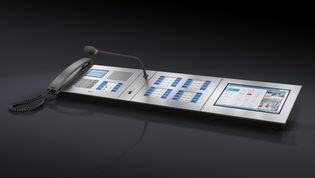
Thanks to their modular design, Commend’s Control Desks are
easy to customise to any required application, and they scale up to any required size just as easily.
Conquering the world from Salzburg
Talking with Andreas, we learn that Commend International was founded in 1971 in Salzburg, that it is still 100% owned by the Austrian founder’s family, and that it serves a global market through its worldwide network of subsidiaries and distribution partners, with an export ratio ranging in the neighbourhood of 95%. In total, Commend employs 400 staff. 150 of them work at Commend’s Salzburg headquarters, which also house the Research & Development department and the production facilities. Asked what it is that distinguishes Commend systems and allows them to be sold successfully to a worldwide market from a high-wage country like Austria, Andreas Pfeiffer explains: “Our intercoms are security and communication systems for protecting people, buildings and property. This means our products are not the typical door buzzer terminals you would find in a residential building.” Whether in the form of emergency call terminals at the train station or in a road tunnel, or communication terminals in hospitals or at the car park gate, to name but a few applications ‒ there are lots of situations in our daily lives where we will come into contact with Commend intercoms. Excellent speech quality and high availability, says Andreas Pfeiffer, are essential. The devices’ achieved high audio quality is therefore one of the core competences that contribute to Commend’s sustained success.
Security and communication
We are listening attentively, as he continues: “Unlike telephony, which has a 3.4 kHz standard, we use 16 kHz, a much wider frequency band. This allows us to filter out unwanted background noise much more effectively,” Andreas Pfeiffer tells us. “A pristine voice signal and crystal clear speech intelligibility are extremely important, especially in emergency situations. The better support staff can understand what the caller is saying the faster they can react by sending the emergency and rescue services.” The devices’ ability to eliminate distorting background noise rests on highly specialised, complex calculation algorithms ‒ that is all he is allowed to say about this closely guarded industrial secret. Using the example of in-car hands-free mobile phone systems, Andreas Pfeiffer explains that there is still lots of room for innovation when it comes to audio data recording and processing: “The way this is usually achieved today is by using multiple microphones,” he says. “That’s also the reason why, for example, latest-generation in-car hands-free systems work actually so well that you can sometimes not even tell if the caller is currently on the motorway or sitting quietly in a comfortable chair at home. The wind and engine noises are hardly audible anymore. Basically, the manufacturers of these systems use the same technologies that we use for this purpose.” Where security applications are concerned, the latest developments are going even further: the systems can detect unusual sounds, such as breaking glass or a scream, and trigger an alarm automatically. “A highly useful feature for train station platforms or public places,” as Andreas Pfeiffer explains. Talking about a current research and development project, he adds, “The member of staff at the control desk can then remote-control a video camera and point it at the location where the sound was detected to get a visual overview. This helps to ensure a decisive, targeted response.”
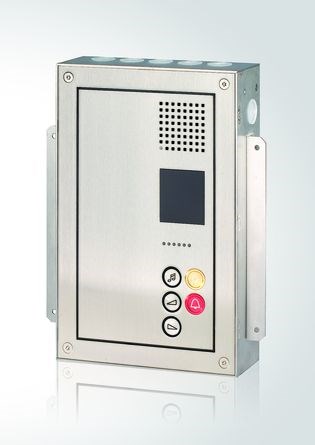
Cell intercoms are used in prisons and custodial facilities.
They support music feeds (which can be withdrawn from outside as a
disciplinary measure), and even mobile phone call detection.
One-stop solutions for a variety of applications
Intercom systems by Commend integrate seamlessly with video surveillance systems and equipment for RF radio, alarms and controls. All components converge at a central platform: The wide spectrum of devices ranges from stylish Intercom terminals on the one end to modular, expandable Control Desk Systems and corresponding server architectures on the other. “Especially in security sensitive applications, the ability to trace past events depends crucially on the data storage method,” Andreas Pfeiffer explains. Included in Commend’s product portfolio are a variety of industrial solutions, such as terminals for Ex zones, for example. Durability and availability around the clock are also essential features for the in-cell terminals used in prisons and forensic clinics. Voice and video lines running between cells, hallways, doors, airlocks, gates and the master control desks are constantly monitored electronically, providing protection and safety for wardens and inmates alike. “This is a particularly interesting segment,” Andreas Pfeiffer tells us. “We pack a lot of useful extra functions into the terminals,” he says. “Things like music feeds, which can be disabled from outside the cells, or mobile phone detection. Basically, we can control the entire cell infrastructure through our systems.”
Current requirements of embedded hardware and software
I am so fascinated with all the many Commend solutions that I almost forget to ask Andreas about his new position and his embedded systems work. “We are around 40 in-house developers here at headquarters,” he says, commenting on the department he has been responsible for as “Head of Research & Development” since last summer. “All our intercoms are based on the same embedded platform, which is now more than ten years old. This is why we are currently in the process of developing an all-new system architecture.” For Commend, standardising their hardware is the way to go. In this they are in line with a current trend that has emerged across the entire industrial sector. Commend’s core competence is shifting more and more towards the software side of their solutions ‒ software engineers currently account for three quarters of the intercom manufacturer’s entire R&D staff. “We use standard processors such as ARM, and we run our applications on commonly available operating systems. That allows us to dedicate more resources to our core competences,” says Andreas Pfeiffer. Still, he adds, it is all a matter of maintaining a balance between reducing complexity and ensuring a certain degree of freedom. “Of course, you also depend on your supplier. That’s why you have to consider very carefully which technologies and partners you choose, which form factors you use for your PCBs, and so on,” says the seasoned embedded systems specialist. “When you go through the effort of developing a new standard, you want it to last as long as possible”. But, I ask him, won’t this play into the hands of competitors who want to copy or re-engineer Commend devices? “Our key know-how and our real competence lies mainly in the software,” he says, “and not so much in the hardware components anymore.” “I like to compare our job with that of a baker or pastry chef making a cake. They don’t farm their own eggs or grow their own grain either to meet their demand. They’ll purchase all their ingredients, of course, so they can concentrate on their real competence: baking cakes. A particularly business-minded baker may not even mix the dough himself but have a ready-made mix supplied as well, which would allow him, for example, to concentrate exclusively on adding special kinds of icing or creative designs for his customers.”
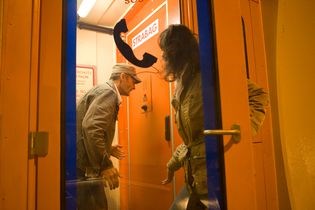
An emergency call station in the 2,150 m Henndorf road
tunnel near Salzburg: thanks to built-in 16 kHz speech quality,
the Commend equipment ensures excellent intelligibility despite the loud background noise.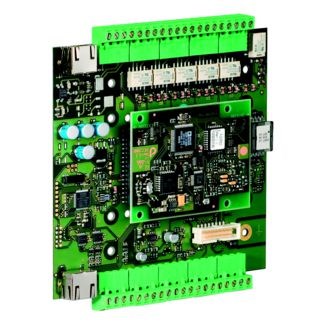
An embedded board from Commend’s R&D laboratories:
Standardising hardware components frees up resources for software development.
Bright future
So there is quite enough work for Andreas Pfeiffer to get on with in his new job ‒ especially in view of the constant further development of the technologies, which keep opening up new application areas for Intercom solutions. Security systems on underground trains or monitoring systems for intensive care units in hospitals are only two recent examples. With the interview over, we are treated to a guided tour of the facilities before it’s time to take our leave. Back in the car I say to Monika, “Alright, I’ll admit my guess with the ‘supermarket announcement thingy’ was a bit far off the mark. But look at it this way: if we had known in advance what kind of high-tech solutions Commend are actually selling all over the world, we would have missed out on all those nice surprises today.”






Comments
There are no comments yet for this item
Join the discussion